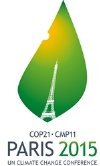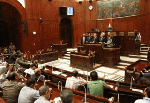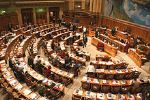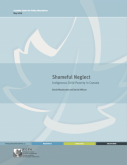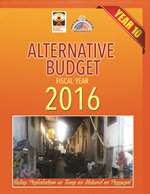Social Watch news
Published on Tue, 2016-06-07 11:01
In describing the Paris Agreement (PA) as being "historic" and an important "milestone", key developing countries stressed that the Agreement is to enhance the implementation of the UN Framework Convention on Climate Change (UNFCCC) and not to replace it. At a side-event jointly organized by the South Centre and Third World Network on the first day of the Bonn climate talks (16-26 May), delegates from India, China and Egypt presented their views on the PA. They also stressed the need for a balanced approach in the implementation of the PA, emphasizing the importance of all elements including mitigation, adaptation and the means of implementation. |
Published on Sun, 2016-06-05 21:14
The defining feature of the framework for Egypt's national sustainable developmental strategy is the lack of a detailed roadmap to achieve several key goals, especially reducing poverty and unemployment and tackling the informal sector, for which it also lacks indicators. This is in addition to the lack of clarity in implementation mechanisms and the lack of consistency among the goals, despite the overarching strategy. The indicators used to measure the goals reflect the Government's continuation of the neoliberal approach, which is contingent on the development of the private sector and dependent on it to finance the development goals. Thus, for example, to reduce the deficit, the strategy does not include raising taxes on companies, instead opting to tax consumers, such as with the 10 percent value added tax (VAT). In addition, the strategy differs in important ways from previous development strategies, none of which were discussed in Parliament or through any sort of social dialogue. |
Published on Sun, 2016-06-05 21:09
The successful implementation of the 2030 Agenda requires bold and transformative steps that are urgently needed to shift the world on to a sustainable and resilient path. In order for it to be a collective journey, on which no one should be left behind, the scale and ambition of the 17 Sustainable Development Goals and 169 targets require a broad and integrated approach not only to balancing and realigning the normative architecture of the global economy but also to restructuring regional and national political-economic practices. Politics as usual and economics as the determined by the rich and powerful will have no place on this new path. Merely tinkering with uncomfortable edges of the micro-economic status quo will not do. The historical direction and social-structural content of such a shift will involve the modification of the deep structures of poverty in the periphery economies up to and including addressing the different aspects of state autonomy and the underlying democratic deficits that stand on the way of building sustainable national economies. |
Published on Thu, 2016-06-02 21:22
The connection between civil and political rights and tax policy is so strong, that in a 2014 report on tax policy and human rights (“the report”), the UN Special Rapporteur on Extreme Poverty and Human Rights in 2014 said that the link runs both ways. That is, civil and political rights bear consequences for tax policy. But the formation of accountable states is closely tied to the emergence of taxation. And where tax abuse and unfair tax practices erode confidence in government the environment will be less prone to foster the right to take part in the conduct of public affairs. |
Published on Thu, 2016-05-26 17:20
Every country and every region has something to do in the new global Agenda 2030, said Social Watch coordinator Roberto Bissio in Berlin, interviewed by Internationale Politik und Gesellschaft (IPG). Bissio said that ithe new agenda is more comprehensive. The rich countries are not only required to provide aid but also to introduce changes at home and to look at the footprints they leave, the impact of what they do internally in the global atmosphere, the oceans and the economy. "It is also an Agenda that provides major opportunities for us as citizen groups to interpelate our governments and ask policy makers what are you doing about this agenda that is relevant for all of us." |
Published on Wed, 2016-05-25 13:52
The commodity slump has cooled the global land rush. But land rights are still under pressure, requiring action at local to global levels. The commodity price hikes of 2007-2008 and the ensuing wave of transnational land deals for agribusiness investments in low and middle-income countries placed land rights at the centre of international development discourses. In many agrarian societies land underpins livelihoods, social identity, political power and the collective sense of justice. Land is also a recurring source of conflict. So addressing land rights issues is a welcome development priority. But pressures on land rights in low and middle-income countries are changing, for three reasons. |
Published on Fri, 2016-05-20 17:59
A few weeks ago the Finance Committee of the National Council moved for Switzerland's official development assistance to be reduced to 0.4% or even 0.3% of gross national income over the coming years. That would mean cutting expenditure on actual development cooperation abroad by 30% to 50%. Care of asylum seekers here at home, which Switzerland absurdly counts as development spending, would then account for one fourth to one third of this expenditure. In the National Council itself, the Finance Committee's radical cost-cutting proposals will hardly find a majority. It transpires from centre-right circles, however, that a call will indeed be made for cost-cutting in long-term development programmes in order to release more funds for short-term emergency humanitarian aid. The call will also be for development cooperation to be more closely tied to Switzerland's own interests, namely to migration partnerships and agreements for the repatriation of asylum seekers. |
Published on Fri, 2016-05-20 10:23
Canadian Centre for Policy Alternatives (CCPA) launches the report "Shameful Neglect: Indigenous Child Poverty in Canada". The report calculates child poverty rates in Canada, and includes the rates on reserves and in territories—something never before examined. The report also disaggregates the statistics and identifies three tiers of poverty for children in Canada, finding the worst poverty experienced by status First Nation children (51%, rising to 60% for children on reserve). The second tier encompasses other Indigenous children and disadvantaged groups (ranging from 22-32%), and the third tier consists of children who are non-Indigenous, non-racialized and non-immigrant, where the rate of 13% is similar to the OECD average. |
Published on Fri, 2016-05-13 10:05
The work of central banks is not easily understood and often takes place out of direct public view. Equipped with traditional macroeconomic tools of the trade, central bankers fulfil their main function – to keep prices stable by fighting inflation – through regulation of money supply and interest rates. In addition to this monetary function, some (but not all) central banks are also involved in regulating or supervising the financial sector to ensure the health of financial institutions. In the aftermath of the global financial crisis, central bank participation in sovereign debt rescheduling and support for the stability of the broader financial system is coming into sharper focus. Depending on the mandate, central banks take on other non-monetary functions as well, such as promotion of economic development, job creation, and financial inclusion. Central banks in developing countries that come under the direct influence of the executive branch (which also raises legitimate questions concerning their independence) tend to make active and creative use of non-monetary functions in ways that can directly benefit individuals and households. |
Published on Fri, 2016-05-06 12:33
It has been a decade since Social Watch Philippines (SWP) convened the Alternative Budget Initiative (ABI). The consortium has now blossomed to around one hundred and sixty strong civil society organizations and individuals conducting research and lobby efforts in coming out with annual budget analysis, campaigning against lump sum funds, and engaging the national government and the legislature in the budget process by coming out with a civil society-crafted alternative budget, otherwise called as the Orange Book. Throughout the years, the effort of the consortium to directly engage through the budget process has led to the forging of partnerships with concerned agencies and champion legislators, expansion of the ABI network to more organizations and individuals who share SWP and ABI’s development vision through budget advocacy, and the continuing presence of the ABI in House and Senate to present alternative budget proposals. |
SUSCRIBE TO OUR NEWSLETTER

